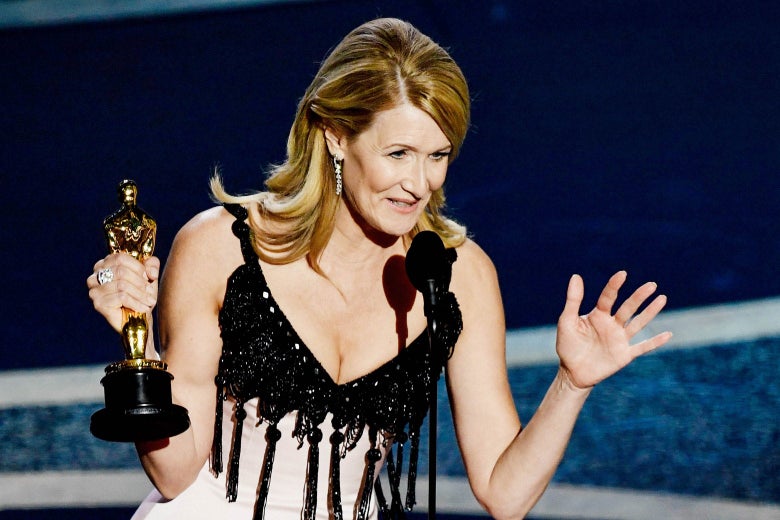
Laura Dern’s ascendance has spanned decades, but its culmination happened before the Academy Awards.
Kevin Winter/Getty Images
“This is the best birthday present ever,” Laura Dern said at the end of her charming—if less daffy than longtime Dern aficionados might hope—acceptance speech for Best Supporting Actress on Sunday night. Dern’s birthday is actually Monday, when she turns 53, and for 35 of those years we’ve been watching her take unbelievable risks and bring brilliant light and darkness to screens both big and small. Her decadeslong artistic partnership with David Lynch has long been the work for which cinephiles revere her—for several decades the closest she came to an Oscar was Lynch’s quixotic one-man campaign for her performance in Inland Empire—but over the past 10 years a new generation of directors and writers have found Dern. Mike White, Paul Thomas Anderson, Jean-Marc Vallée, Ramin Bahrani, Kelly Reichardt, Jennifer Fox, Rian Johnson—they grew up with Dern’s performances in the 1980s and 1990s, and their embrace of Dern is the reason the Dernaissance has taken hold.
This year, Greta Gerwig and Noah Baumbach found in Dern the perfect moral compass, of sorts, for their films. As Marmee in Little Women, Dern was loving, fierce, “angry nearly every day.” As divorce lawyer Nora Fanshaw in Marriage Story, she was uncompromising yet, at the end, a symbol of the limitations of the adversarial system to which Adam Driver and Scarlett Johansson’s characters subjected themselves to. In Dern’s showcase Marriage Story scene, she explains to Johansson why she may not admit to any weakness in court—because the court, she reminds Johansson, exists in a patriarchal society that “can accept an imperfect dad” but not “those same failings in mothers.” It’s a fiercely feminist speech, yes, but also a rallying cry from an attorney determined to make sure her client doesn’t risk the win she feels she deserves.
The heart of Dern’s thank-you speech was a tribute to her parents, “my acting heroes,” Diane Ladd and Bruce Dern. Laura Dern’s first nomination came in 1992, when she was nominated alongside her mother for the undersung coming-of-age drama Rambling Rose. To see Ladd out in the audience, 28 years later, tearing up at her daughter’s speech, was a remarkable bookend to that unique moment, still the only time a mother and daughter have been nominated for the same film.
Dern’s speech was understated and lovely. I wonder if it wasn’t a kind of response to what happened to her at Saturday night’s Independent Spirit Awards, where the Gay Men’s Chorus of Los Angeles sang a comic tribute to the queerest moments in this year’s films. The song ended with a glorious, triumphant chorus of “LAURA DERNNNNN! LAURA DERNNNN!” Dern stood, delighted, and danced along, and the affirmation and love directed to her from the stage—from the entire room, from the generation that has come to her work and found an icon and a hero—felt like a kind of benediction. I loved Dern’s sweet Oscar speech, but it was this moment that I’ll remember as the awards-season pinnacle of glorious, wild Dernitude.
Read more in Slate about the Oscars.
Readers like you make our work possible. Help us continue to provide the reporting, commentary and criticism you won’t find anywhere else.
Join Slate Plusfrom Slate Magazine https://ift.tt/379ZZQB
via IFTTT
沒有留言:
張貼留言